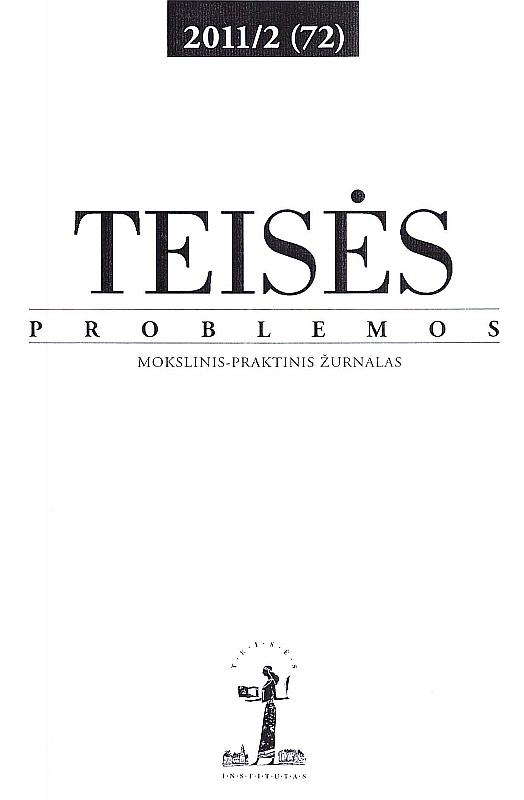Amicus curiae institutas užsienio šalių ir tarptautinėje teisėje: (dis)kvalifikuojantys požymiai ir gretimi institutai
Amicus curiae in Foreign Legal Systems and International Law: Analysis of (Dis)Qualifying Features and Related Legal Phenomena
Author(s): Petras RagauskasSubject(s): Law, Constitution, Jurisprudence, International Law
Published by: Lietuvos teisės institutas
Summary/Abstract: This article deals with some aspects of amicus curiae, phenomenon which is almost unknown in Lithuanian positive law and its jurisprudence. The article presents the spread of this legal phenomenon (at this stage mostly indirectly by giving examples on its various aspects) and its basic elements in legal systems of different foreign countries as well as in international law. A variety of different amicus players is being discussed alongside with analysis on their differences from parties to the dispute, interveners, experts and witnesses. A characterisation of interaction between amicus curiae and lobbying is provided as well. It is possible to analyse the amicus curiae in different aspects: social, legal, political, cultural, etc. But it seems that one of the most advantageous possible manifestations of amicus curiae in Lithuania could be connected with enhanced openness of the Court. This instrument seems to be quite universal, simple, cheap and effective in the sense of enhanced democracy and civil society. Unfortunately the institution of amicus curiae and possibilities to use it hasn‘t been broadly discussed in Lithuanian yet. Thus the article aims to give some comparative and analytical presuppositions as much as to make some kind of introduction for such a discussion in Lithuania. At the sight of various jurisdictions it is obvious that the concept of amicus curiae is manifold and its certain elements may have significant differences. On the other hand it should be remarked that legal regulation of this form of involvement to the judicial process is rather poor or doesn’t exist at all (depending on certain jurisdiction). It looks like a paradox to see that even in United States of America – legal system where amicus curiae is supposed to be most widely used – this legal phenomenon has no strict and clear regulation, neither in the sense of statutes, nor in the sense of common law; to make it clear even today courts do demonstrate contrary positions in some important aspects. However the lack of regulation and the interrelated lack of legal clarity (at least in some aspects) of the legal institute of amicus curiae should not be seen as a shortcoming only, for it also creates wider possibilities for versatility in gap filling and problem solving during the judicial process. One of the most important questions – whether amicus curiae is a selfless servant to the Court with no interest of his own and with the only task to preserve the honour of the Court, or whether he is an actor which is able (or even more – designed) to defend some specific interests. The usual answer in contemporary legal systems is that such an interest at least should not disqualify a person as amicus curiae. However there are quite divergent versions concerning the limits and acceptable character of allowed interest (including version that person which could not demonstrate sufficient interest should not be accepted as amicus curiae, for example, if the interest is merely academic). There are rules of limitation in different legal systems which prescribes that amicus is not a party to a lawsuit and differs from an intervener, that he is not an expert or witness. But the reality doesn’t allow making a strict disjunction between amicus curiae and these actors. There are situations when these positions intertwine. Such distinction is even less likely to be indispensable when you see how often amicus is invoked to fill the gaps or solve some difficult situations (to defend the interests of third party which do not or even could not come and stand before the Court; to represent the actual interests of defendant which refuses to have a lawyer etc.). The role of amicus curiae could be performed by very different actors. These actors may vary from state or municipal institutions to individuals, from intergovernmental organisations to universities, from religious organisations to trade unions, etc. Nevertheless the practice boldly indicates that amicus curiae have strong ties with representation and advocacy of public interests. It is very common to find that those public institutions ex officio empowered to represent public interests (like Solicitor General) are at the first rank of amici which plays the most important role. Attributed rights or at least actual role of private amici seems to be a far lesser one. Also it is important for the democratic process that amicus curiae has a potential to channel relevant information (including political information) to the Court in order to empower this branch to weight it and to foresee the wider impact of its decisions. Few years ago the Constitutional Court of the Republic of Lithuania has “pushed” our legal system towards the doctrine of stare decisis (which is essential to the precedent law system) the perspective of such channelling could be notably useful and advantageous.
Journal: Teisės problemos
- Issue Year: 2011
- Issue No: 72 (2)
- Page Range: 5-38
- Page Count: 34
- Language: Lithuanian

